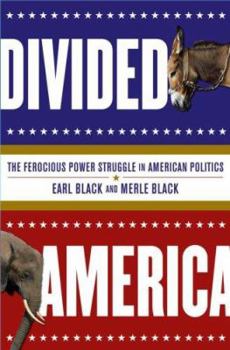Divided America: The Ferocious Power Struggle in American Politics
Select Format
Select Condition 
Book Overview
Now with an updated Afterword -- in which the authors show how the 2006 midterm elections and the Democratic takeover of Congress validate their argument about regional divisions and why and how they... This description may be from another edition of this product.
Format:Hardcover
Language:English
ISBN:0743262069
ISBN13:9780743262064
Release Date:March 2007
Publisher:Simon & Schuster
Length:286 Pages
Weight:1.10 lbs.
Dimensions:1.2" x 6.4" x 9.5"
Customer Reviews
3 ratings
The Sociology of Political Power - How It Is Won or Lost
Published by Thriftbooks.com User , 15 years ago
A thoughtful and insightful analysis of the battle for political power, through a potent regional lens. Earle and Merle Black are two of our nation's top political analysts, particularly on southern politics. This book is a political junkie's delight. If you have ever managed, worked on, voted in or followed a political campaign, you'll have a clearer understanding of how changing demographics, regional concerns, and evolving party ideas affect the balance of power after you read this book.
Good description of one part of a much wider problem
Published by Thriftbooks.com User , 16 years ago
The Black brothers, both professors of political science at different southern universities, have done an excellent job of describing one of America's current ills -- partisanship -- with excellent statistics and research. They have hit on a major flaw with American democracy and describe it accurately. Politics has become "ideologically charged" and point out that America's "unstable power politics generates relentlessly bitter conflicts over a huge range of domestic and foreign policies and motivates activists in both parties to compete fiercely all the time." I see the venom daily -- activists from both sides cutting at each other's throats without being able to compromise. They write: "the incessant personal attacks mean that especially thick skins are necessary for America's leading politicians." They're right. They map out partisanship: Democrats controlling the Pacific & Northeast, Republicans controlling the South and Mountain states, with the midwest up for grabs. That partisan forces are evenly balanced means "ferocious competition" as they rightly point out, leading to a "permanently competitive situation." This doesn't bode well for the future of American democracy, which requires tolerance and compromise to function effectively. What the authors fail to see, however, is the more dangerous, underlying, looming problem with America, of which partisanship is merely a symptom. It is this: the political process is broken. Washington is corrupt. Congress is gridlocked. There's a dangerous concentration of power in the executive branch in one person -- the president -- and the usual system of checks and balances seems to have come undone. The federal system is askew -- ideally state governments should regulate their own economies, but Washington has usurped this power through numerous rulings, often encouraged by the Supreme Court. And this body of unelected justices has, in many respects, assumed a quasi-legislative role, which was never intended by the Constitution's Framers, because it has the power to strike down any law it deems unconstitutional. Washington is like a giant crashed computer, unresponsive to keystrokes, and unable to cope with serious issues such as Social Security underfunding, the specter of terrorism, financial meltdowns, global warming, corruption, lobbying running rampant, and so on. Americans should read not only this book, but "The American Lie" by Benjamin Ginsberg; "The Politically Incorrect Guide to the Constitution" by Kevin R. C. Gutzman; "Common Sense II: How to Prevent the Three Types of Terrorism" by myself; "Up To Our Eyeballs"; "Bad for Democracy" by Dana D. Nelson; "Our Undemocratic Constitution" by Sanford Levinson; "How America Got It Right" by Bevin Alexander (a tough critique of American foreign policy despite the upbeat title). Generally, these are tough, non-partisan looks at a nation in deep denial. I think the problems are so dangerous that a Second Constitutional Convention is required to
Stats freaks, you know who you are, take a personal day, crunch on.
Published by Thriftbooks.com User , 17 years ago
Politics in the U.S. for the past several decades has had the flavor of a pendulum; a slow oscillation driven mostly by indifferent people voicing their disgust with alternate messages. That model has been soundly retired. There are millions of voters, thousands of polling places, hundreds of districts and anyone with a basic knowledge of a spreadsheet program can keep a finger on trends and patterns to a greater extent than the highest paid consultants of just a dozen years ago. The Blacks speak this language; the controlled variable graph cluster. They divide the country into the South, the Northeast, the Pacific Coast and the Midwest. They examine race, gender, religious affiliation and ethnicity. The patterns they show are stark. The campaigns will know well where to spend their money or they will fail. The issues have not lost their importance. But the well-staffed candidate will no longer waste a dime of ad money in the wrong districts. Certain places, certain populations present opportunity. The rest of us will just have to see if we can surprise these hired guns and their finely tuned predictions. Many will complain that the populist notions of participatory democracy have fallen by the wayside; that Tommy Jefferson is spinning in his grave. But it bears pointing out that "participatory" derives from an active verb. Voter turnouts for TV reality shows tower over those of even general elections. Are people truly disaffected with the political experience or just bored? If they are disappointed with the entertainment value of being asked to overthrow their government every November, they'll get no sympathy from candidates and their consultants as they apply the strategies implied by "Divided America." comments invited






